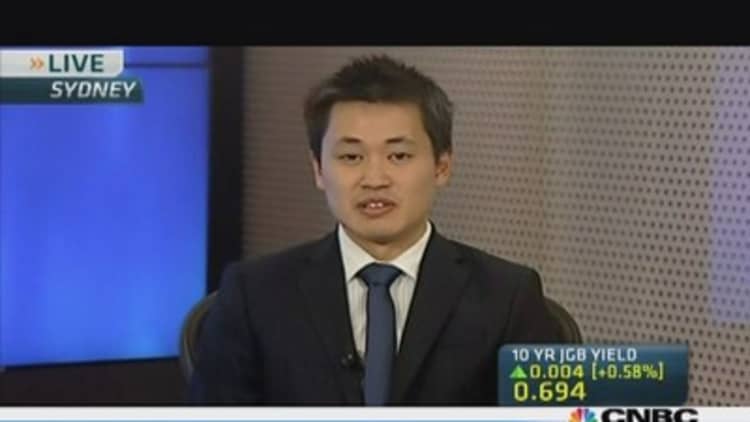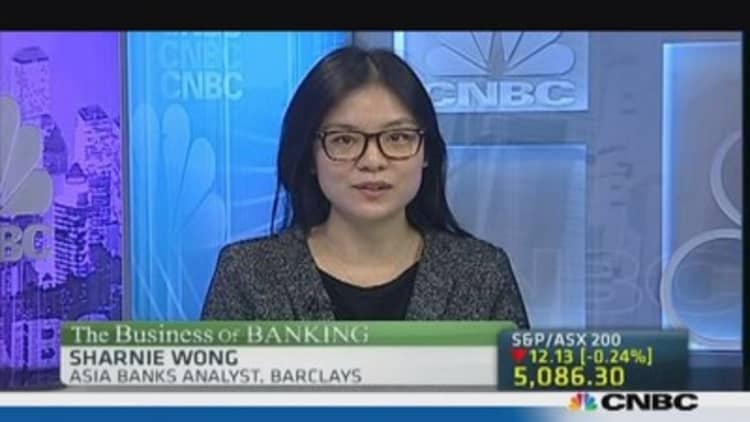Caution dominated the tone of trade in Asian equity markets on Monday after a preliminary reading of Chinese manufacturing activity fell to a three-month low in December.
Investors also adopted a wait-and-see approach before the . The U.S. central bank concludes a two-day meeting on Wednesday amid talk that stronger economic data in recent weeks, including employment and consumer confidence, argue in favor of a reduction on monthly bond purchases.
(Read more: Could this be thebusiest week yet for Asia markets?)
Shanghai sheds 1.5%

China's benchmark index hit a new one-month low after HSBC's flash purchasing managers' index (PMI) for December fell to 50.5, compared to 50.8 in November. Still, the index was above the key 50-line for a fifth straight month.
Financials led the losses Citic Securities down 2 percent and Minsheng Bank down 1 percent after the nation's securities regulator said it will not involve itself in IPO pricing when the current freeze on listings ends next year. Instead, it will allow the market to take the lead in pricing assets.
Automakers declined after the city of Tianjin announced that it will impose quota on new car plates starting next Monday in a move to curb car ownership and restrict traffic. Changhai Auto slumped 6 percent while SAIC Motor fell over 5 percent.
Nikkei 1.6% lower
A stronger currency tempered optimism over upbeat economic data for Japanese investors, leading the benchmark to close at its lowest level in nearly a month.
Dollar-yen fell below the 103 handle, retreating further from last week's five-year peak, which led investors to sell off blue-chip and currency-sensitive exporter stocks. Index heavyweight SoftBank lost 3 percent while Sharp, Nissan and Honda fell over 2 percent each.
"Just because the yen is weak doesn't mean companies who have already lost their competitive advantage to Asian or overseas exporters get it back. We've been quite cautious on Japanese exporters even as the yen has been weakening," said Nicholas Weindling, fund manager at J.P. Morgan Asset Management.
Released just before the market open, business sentiment in Japan among big manufacturers rose to its highest level in six years in the three months to December, the closely-watched Tankan survey showed.

Sydney 0.2% lower
Australia's index hovered near a new three-and-a-half month low, trading below its 200-day simple moving average of 5,106 points for a third straight session. Meanwhile, the Australian dollar slipped 0.2 percent against the greenback following China's weak factory data.
Sentiment was dampened after Prime Minister Tony Abbott said on Sunday that the country's finances were in worse shape than previously believed. Experts say this could mean Abbott will backtrack on his pledge to return the budget to surplus within four years.
(Read more: What every investor has to prepare for this week)
Wesfarmers rose 0.5 percent after agreeing to sell its Australian and New Zealand underwriting operations to Insurance Australia.
Investment bank Macquarie lost 5.7 percent after getting clearance to offload its A$1.3 billion stake in Sydney Airport.
Kospi flat
South Korean stocks closed at their lowest level in over three months for a third straight session as foreign investors continued to be net sellers of domestic shares.
Large-cap stocks such as Hyundai Motor and LG Electronics eased over 1 percent each.
Emerging markets lower
Expectations of a reduction in U.S. stimulus led Indonesia's Jakarta Composite to close 1.2 percent lower while Indian shares dipped 0.2 percent.
— By CNBC.com's Nyshka Chandran. Follow her on Twitter @NyshkaCNBC

